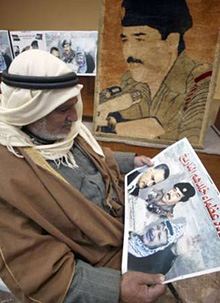 |
 |
 |
 Editorials | January 2007 Editorials | January 2007  
An Unbelievable Gift
 Laurent Joffrin- Libération Laurent Joffrin- Libération


| | A Palestinian man holds a poster depicting former Iraqi President Saddam Hussein (C in poster) late Palestinian leader Yasser Arafat (R in poster) and late President of Egypt Gamal Abdel Nasser in the West Bank city of Jenin, January 2, 2007. The poster reads 'great leaders that history immortalized.' (Reuters/Mohamad Torokman) |
Saddam Hussein died without blinking. Hanged high and hurriedly like an outlaw in the Old West, he suffered his fate with the dignity of a head of state. An evil genius demolished, he succeeded - for a last time - in inspiring fear, if not respect. He was hated as a torturer. He is lamented as a victim.

Why give him that unbelievable gift? In the bizarre American mindset, reproduced in the embryo of Iraqi democracy, one looks in vain for the logic of this crime that - according to the classic line - is worse than a crime: a mistake. In the chaos of Iraq, this botched execution gives the worst possible impression of democratic justice. Three years after an operation that should have served as an example for the entire Middle East, the legal murder of Saddam further deepens disorder and discredits a little more those American troops who came as liberators and changed into occupiers.

It will be noted that Iraqi television, in the image that will remain, stopped before the opening of the fatal trapdoor. One has to go online to see the document filmed by a cell phone that proceeds to the end of the execution. In other words, the execution should have served as an example, but they don't dare show it. What is an example that one dare not show? A shameful act, in fact.

Will people feel sorry for Saddam? Beyond the dread that the death of a person always arouses, certainly not. Rarely has a dictator made his people suffer as much or killed as many of his compatriots, not to mention the hundreds of thousands of Iranians - or the thousands of Kuwaitis - that he sacrificed to his cruel ambition. We mustn't feel sorry for someone who held human life in such scant esteem. Rather we must feel sorry for his executioners. How can they establish an acceptable order on a foundation of revenge? They condemn themselves to being no more than a point in the cycle of crime and punishment. Saddam fell in the midst of Shiite imprecations. The Sunni will make a martyr of him. It's the everlasting cycle: death, death forever resumed. Where is the New Middle East? Long oppressed, the Shiite majority regains the upper hand. A clan wins and settles its scores.

The United States wanted it, people will say, and it is incontestably a democracy. But the world's democratic space is cut in two: Europe rejects war; America makes it. The former seeks compromise; the latter, confrontation. People will acknowledge that the crusading spirit has been useless. George Bush has made more Americans die in Iraq than bin Laden did in New York on September 11, 2001, and the most senior American officials have confessed that it's been a fiasco. The war against Saddam has encouraged terrorism. His death takes place in the midst of bloody chaos.

We look for precedents: the Convention that immolated Louis XVI, Lenin having the imperial family assassinated at Yekaterinburg. In both those cases, a civil war was taking place and a reign of terror being ushered in. Yet, as the craze of purification was dissipating, de Gaulle pardoned Pétain - although he had been convicted in correct and due form. Turn the page? Churchill deemed that the Nazi leaders should have been executed without ceremony. But Churchill was tempestuous. Mauriac, "Saint François of the Assizes," pleaded for generosity and reconciliation - as did Camus - against the Communists who demanded blood. The resulting trials are a lesson for collective memory. That of Saddam will not serve the Iraqi people in any way.

There is often a foundational crime at the origin of civilizations. But what kind of civilization hangs in the small hours of the morning, in a secret lean-to, filmed by the eye of a peeping camera, on the day of the biggest religious holiday? An act of justice was expected. We get a crime of civil war.

Translation: t r u t h o u t French language correspondent Leslie Thatcher. | 
 | |
 |



